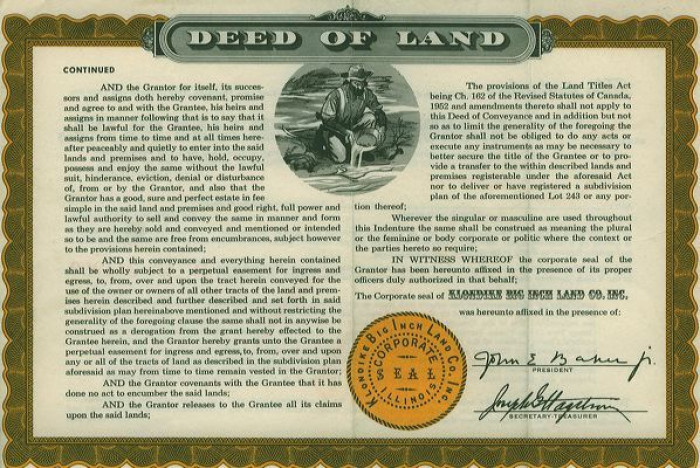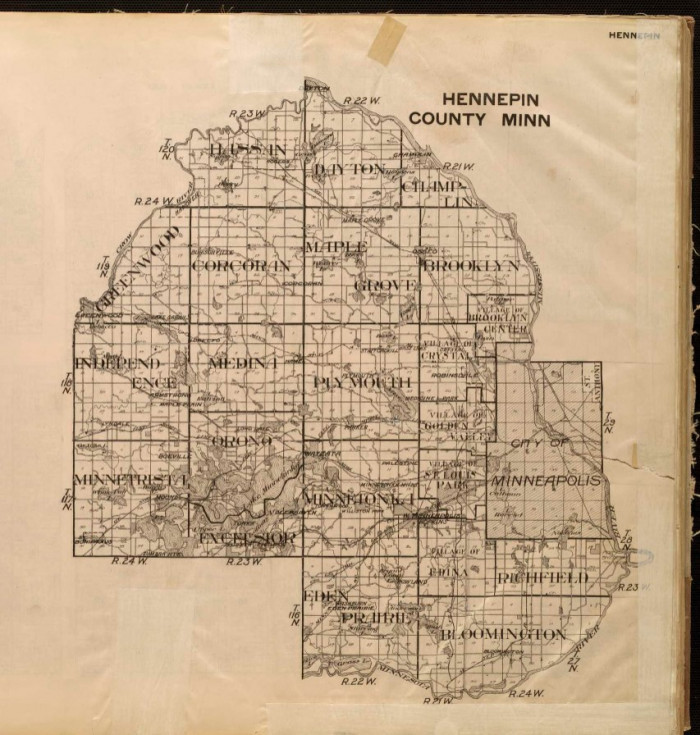How to Search Property Records and Learn Everything About a House: Find Land Records
Uncover the Past of Old Houses: A Comprehensive Guide to Researching Property Records and Gaining Insights About a House's History Through Land Records
August 21, 2023
Hennepin County, MN Plat Book, 1916
Start Your Search: How to Find Property Records and Learn About the House
Are you looking to dive into your home's history? Here's how to search property records and find out everything there is to know about the house. Whether it's to understand your home's value or to satisfy your curiosity, searching for property records can provide a wealth of information. So, how do we conduct this search?
Firstly, jump online. The digital revolution has made it fairly easy to find a sweeping range of property information, all sitting at your fingertips. Real estate records are often held by the local government or county, and the good news is most have taken their databases online, making the process more accessible than ever.
Start in the public records for your home's county. This will enable you to find land records and other valuable data. Next, look into the Recorder of Deeds. If you're asking 'Where can I research my house’s historical property records?' look no further than county-held documents such as the deed. The deed will give data about your home's past owners and any transfers of the property. Intriguingly, such records can unearth trends in the local property market, as well.
Thirdly, check out building permit information. Not only can permits provide detailed info about renovations or improvements, but also they can reveal where your home stands in terms of code compliance. This will allow you to foresee and plan for future maintenance or repair needs.
Finally, don't neglect tax records. Property tax documents will offer insight into your home's estimated value over the years. While it may not sound as thrilling, they can uncover whether the house's value has increased or decreased and why this may be the case.
Remember, though - don't rush. Conducting a thorough search of your home's records can take time, but the treasure trove of facts you'll find may surprise you. From the age of your house to past remodeling endeavors, your patient search may reveal a hidden gem about the property that could boost your home's value or charm.
In summary, to effectively search property records, go online, and check county records and crucial documents like deeds, permits, and tax history. By finding out comprehensive property information, will not only satisfy your curiosity but put you in a stronger position if you ever decide to sell your home in the future.
Land Records: A Crucial Part of Property Records Search
When it comes to a property records search, one can't overlook the importance of land records. Whether you are in the market for a new house or just researching properties, these records hold vital pieces of information that can significantly aid in your search. They can give you a detailed picture of a property's history, including past owners, any legal disputes, and the land's value over time. Therefore, you need to consider searching land records thoroughly to truly understand all about your desired property.
The first step in the process is to find the right sources for your records search. With the prevalence of online platforms today, it's very simple to locate these land records. There are countless websites and databases that allow you to perform a comprehensive property records search. Sometimes, this process might involve some fees, but typically, you can access basic information about the land and its history for free.

It's essential to remember that when you're searching, you should be patient and persistent. These records searches might take some time, especially if the piece of land has a long history. However, your perseverance will pay off when you find out everything you've wanted to know about your dream property.
Digging deeper into the land records will also reveal information on deeds associated with the property. These deeds can provide data about past transactions, ownership changes, and land usage. Moreover, studying these can hint at any potential disputes or issues related to the property. So, don't forget to pay extra attention to the deeds when you're executing a records search.
Lastly, one should never underestimate the importance of professional help in your search. A qualified real estate attorney or experienced surveyor can help you find and analyze these land records, making the process less time-consuming. They will not only help you locate relevant records and interpret them but also guide you on how to handle any problems that might arise during the property records search.
In conclusion, a thorough records search, including finding and analyzing land records, is an essential part of purchasing a property. It helps you get acquainted with the property and ensures a smooth and informed buying process.
A Closer Look: Using National Archives and Telephone Directories to Find Land Records
Taking a closer look at the entire search process, the best place to start is by taking advantage of national archives. These resources are a gold mine for those who know how to locate the right information. Searching property records, particularly those pertaining to land, can seem like a daunting task. However, it's essential to remember that these archives contain more than just bits of old paper. They are instead a comprehensive collection of historical records, often holding the key to a property's past.
To find land records in the national archives efficiently, it's crucial to know what you're looking for, and at the same time, understand the classification of these records. They're systematically arranged, making your search less arduous; knowing how to navigate these systems is incredibly beneficial. A house's past and its land history are intricately woven into these archives, and with diligent search, you're bound to uncover valuable information.
On the other hand, telephone directories present an off-beaten path in this search journey. Although they may seem outdated in this digital era, they could drastically simplify the task at hand. It's straightforward to locate old telephone directories, either in digital form or in libraries. These directories often include addresses, making them a handy tool to find said house or land history. Landowners, their businesses, and their property details have landed on these pages, providing yet another avenue for investigation.
In your search, being thorough is paramount, and weaving through previous records is a part of this. Looking at these old records can give you an idea of the previous ownership, land use, and any issues that the property may have had. These records from the past can add volumes to the history of the house in question.
When you're exploring archives and directories, it's essential not just to find the information but also to interpret and understand it. It does no good to locate an old record if you can't understand the story it tells about the property. However, if you put the pieces of the puzzle together, you can learn everything there is to know about a house. Keep in mind that with every find you make, you get one step closer to completing the picture of the house's property records.
This search process needs patience, attention to detail, and quite a bit of skill in dealing with archives and records. But once you've mastered the ability to find, search, and locate land records within national archives and telephone directories, you'll be ready for any property search task that comes your way.
Deed and Tax Records: An Integral Part of Understanding a Property's History
Understanding a property's history involves deep and thorough research encompassing various aspects. Some of these include going through land records, phone directories, national archives, and, most importantly, deed and tax records. The intrinsic details these records hold play a crucial role in unraveling everything there is to know about a house.
When you're on a quest to find property records, the first stop is often the deed. The deed presents the legal evidence of a property's ownership and tracks all the ownership changes that have occurred over time. It is a fundamental step in tracing a house's history. Because without understanding who owned the property and when you can't fully appreciate the property's history. Digging into a deed allows you to explore the house's past life before your planned move.

Another vital piece of the puzzle lies in tax records. You often must visit the tax assessor's office to pull these files. These records provide a wealth of information regarding the property's financial history. You not only get insight into the previous owner's financial obligation towards the property but also how it has changed over time. Every tax payment reveals a part of the property's history. And each tax assessment offers an understanding of how the house's market value has fluctuated over time.
No property history is complete without paying heed to tax records and deeds. Monitoring these reveals changes in property taxes, fluctuations in house values, transfers of ownership, and beneficial information that could maybe even help you negotiate a better deal on your move.
So the next time you're on a mission to understand a property's history remember both the deed and tax records. With this approach, you'll get an all-inclusive look at the home's past. From who held the property's deed, the changes in the house's value due to property taxes, to the changes in taxes that influenced the owners' decision to sell or hold onto the property, will be at your fingertips. The more thorough your understanding of these records, the more satisfying your exploration into your prospective home's history will be.
Strengthen Your Searches: A Student's Guide to Comprehensive Land Records Information
When you're looking to further strengthen your searches, you'll find our student guide essential. This comprehensive land records information resource helps you understand everything about a property. Whether it's searching for the home loan history, investigating past owners, or finding out about renovations and changes made to the structure, there's a wealth of information waiting to be discovered.
Firstly, to search property records efficiently, you need to arm yourself with effective research strategies. Start with a broad search, then narrow it down as you gain more information. For example, begin your search with the homeowner's name or the property address then deepen your inquiry with more specific details. It can be a time-consuming process, but the results can be incredibly revealing.
Secondly, understanding land records is instrumental in determining loan rates. The value and sales history of a property come into play when banks or other financial institutions decide how much to lend. These details are often tucked away within these records, a factor that further reinforces their importance in the home loan process.
Now, for students who might wonder where to find these records, they're not as elusive as you'd think. County and town offices keep detailed land records. Plus, most physical records have been digitized, meaning even historical land records can be accessed with a basic search. This step can unearth a goldmine of information about a property which proves invaluable during your research.
Another useful tip when you search is to utilize online resources. In addition to county offices, numerous websites specialize in real estate data. These can provide you with loan rates history, tax records, and detailed information about past renovations. Essentially, these tools enable a deep and meaningful search, allowing you to learn everything about a house.
As you learn, remember that land records are just one part of a bigger picture. They go hand-in-hand with tax records, property deeds, and property histories. All these elements combined give the complete backdrop of a property. In essence, each piece of information you find adds another layer to your understanding of the property's larger story.
In conclusion, to truly strengthen your searches, take the time to learn how to navigate and extract comprehensive land records information. Not only will this uncover hidden details about a property, but it will also make you an informed and savvy researcher.
Wrap-Up: Completing a Detailed Estate Overview and Property Records Searches
When completing a detailed estate overview, you'll come across an array of information that gives you a multidimensional view of the property. Property records searches are crucial in this process, as these records entail crucial information about the home, its previous owners, possible legal issues, and even tax records. Such searches are often initiated by home buyers or individuals interested in a particular estate, mostly to find authentic and comprehensive information about the property before the purchase.
The process begins with a broad search, where you find basic information about the property. These details include the registered owner's name and the legal description of the home. As you continue searching, you delve deeper into more detailed aspects of the property, digging into land records that reveal intricate details about the estate. Through this, you can learn significant aspects like the estate's age, zoning information, and the history of any changes made to the estate.
Simultaneously, your search also lands you in national archives and telephone directories. While they might seem unrelated, they can be beneficial in your quest to find more details about the property. The national archives hold a plethora of historical records that can tell you an incredible amount about your property's past, while telephone directories can give you a chronological report of previous occupants.
Then comes the examination of critical documents like deed and tax records. Looking at these records is an integral part of understanding a property's history. They're sources of confirmed information about property ownership, transaction details, and tax history. These records searches are critical before taking out personal loans for buying the property, as lenders often require comprehensive property details.
It's immensely helpful to learn the nuances of such searches through guides that help you strengthen the effectiveness of your search efforts. 'A Student's Guide to Comprehensive Land Records Information’ is one such guide that walks you through a detailed process of property records searches. The skills you learn through these guides can help you manage a more effective and efficient search, helping you find the right property for your needs.
So, remember, a thoughtful and detailed estate overview coupled with diligent property records searches isn't just a process. It's a knowledge accumulation journey where you learn, find, and search about your prospective home, making your estate purchase decision a well-informed one.
Lastly, make sure to search our database to see if someone has already saved property records about your home.

5 Historic Cities Every Architecture Lover Should Visit
From Savannah to Santa Fe, these five cities are a dream for architecture and history lovers. Discover where to go, what to see, and how home history comes to life.

How to Prevent a Property from Becoming Abandoned
As a result of the United States housing foreclosure crisis from 2007-2010, the amount of foreclosed, abandoned, and unclaimed properties drastically increased, which can diminish the market value of surrounding properties.

The Haunted Hallways of the Winchester Mystery House: Who dared to stay and why?
Why did Sarah Winchester build the house like she did? And what happened to the home when she died? Uncover the story behind the Winchester Mystery House.

Uncovering the Connection Behind a Minnetonka Home and the Magic of Dayton’s Holiday Displays
A routine look into a home’s past turned into a journey through Dayton’s holiday history, complete with Dickens villages, giant Christmas trees, and Minneapolis nostalgia.
